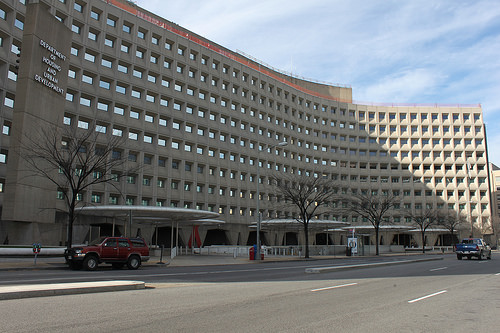The Wall Street Journal editorializes
today, not for the first time, about the long-running dispute
between New York's suburban Westchester County and the U.S.
Department of Housing and Urban Development. Even if you're not a
former county resident (as I am), it's a dispute worth knowing
about, with many implications for property owners in the rest of
the country. Excerpt: 
At issue is a 2009 settlement with HUD in which Westchester
committed to develop 750 public housing units in mostly white
neighborhoods over seven years. County executive Rob Astorino has
financing for 305 units (110 of which are already occupied),
putting Westchester ahead of schedule. ... [Not
satisfied,] the agency is interfering with local zoning in
Westchester to force more racial diversity on suburban
neighborhoods. Last week, HUD New York's Director of Community
Planning and Development Vincent Hom wrote Mr. Astorino and
threatened to cancel $7.4 million in unrelated housing and
community development funds. To keep the cash, Westchester must
produce "a satisfactory zoning analysis and plan to overcome
exclusionary zoning practices."
Part of the county's defense is that under New York's system of
home rule, towns enjoy legal independence and their surrounding
counties cannot simply order them to change their zoning. These
town zoning laws assuredly perpetuate economic stratification -- if
every home needs to be on an acre or two with well-and-septic,
you're likely to draw an affluent average resident -- and
libertarians, with some notable exceptions such as Richard Epstein,
have often dismissed zoning based on economic-stratification
motives as bad policy, improper infringement on property rights, or
both. But zoning for economic stratification, when distinct from a
racial motivation, has not up to now been thought in itself to
violate federal law, and part of the question in the Westchester
case is whether HUD will succeed in developing such a norm.
(Westchester argues with considerable evidence that affluent,
heavily zoned towns like Scarsdale, Chappaqua, and Katonah have a
history of being relatively welcoming to minorities, and have long
scored well on measures of integration when compared with other
similarly affluent communities.)  
 For a libertarian, it's easy to click past
For a libertarian, it's easy to click past
stories like these on the grounds that 1) this is a complex dispute
among levels of government, not directly between the state and the
individual citizen; 2) it's about time someone pressed these towns
to reconsider economic-stratification zoning, so why shouldn't that
someone be the feds? 3) HUD's main leverage is its threat to cut
off federal money, and from a limited-government standpoint, the
more federal funds that get cut off the better.
But as usual, it's more complicated than that.
To begin with, in this case -- as indeed in most cases of this
sort -- the threat of a federal funds cutoff is being deployed with
the aim of raising government outlays, not lowering them. HUD is
pressing the county to commit to extremely costly plans for
subsidized housing, at a price tag estimated to run between $730
million and $1 billion. For more on how the modern arrangements
sometimes called "cooperative federalism" operate to push all the
participating levels of government into expanding their level of
activity, rather than employing the ambition of one level to check
another, see Michael
Greve's recent work.
Moreover, the question of whether the federal government can ban
local government practices for which it cannot show racial
motivation, but which have "disparate impact" on one or another
protected group, is emerging as one of the hottest issues in
housing and local government law. Consider, for example, the
situation of a town council that is considering cutting back public
bus schedules or recreation programs with more than their share of
minority users. Even if motivated by budget concerns or an overall
small-government philosophy rather than by a desire to harm or
discourage minority patrons, such cutbacks might be arguably
illegal if "disparate impact" concepts are to rule the day, as the
Obama administration keeps suggesting. 
Not least, the Westchester dispute does relate directly to
regulation of private citizens. As part of its pressure on the
county, HUD is insisting that it is a violation of fair housing law
for the county not to enact an ordinance commanding that private
landlords not engage in so-called source-of-income discrimination
-- which in practice mostly means banning them from turning away
government-aided applicants like those from the Section 8 program.
Nationally, landlord participation in the Section 8 program is
supposed to be voluntary, and many apartment managers and private
renters do not participate, sometimes because of less-than-happy
experiences with Section 8 tenants. If HUD prevails, it will be one
step closer to its apparent goal of requiring -- federal law or no
-- that property owners nationwide consent to become Section 8
landlords, a status that brings them under a variety of additional
regulations as well as itself seriously infringing their freedom to
run their businesses as they please. 
That's one reason even those who aren't fans of restrictive
zoning should hope HUD loses this fight. 







0 σχόλια:
Δημοσίευση σχολίου